Josh Butler
Bill to permit legislating assisted dying laws for territories expected to pass
Northern Territory Labor MP Luke Gosling admits some Indigenous communities have “big reservations” about the expansion of access to euthanasia, but has implored his colleagues to support his bill on territory rights.
Gosling and his Canberra colleague Alicia Payne have co-sponsored a private member’s bill this morning in parliament, which would restore the right for the NT and Australian Capital Territory to make their own laws on voluntary assisted dying – which the territories are currently prevented from doing.
Labor will grant members a conscience vote.
Supporters believe the bill will pass through the House and Senate, but several Labor MPs are expected to vote against the territory rights push due to their opposition to euthanasia. Conservative lobby groups, as well as the Labor senator Pat Dodson, claim the expansion of assisted dying may discourage some people in Indigenous communities from accessing healthcare.
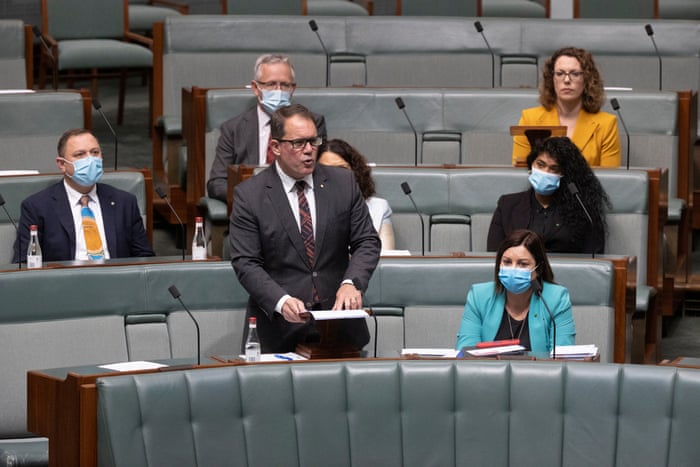
In a press conference following the introduction of the bill, Gosling – the member for the NT seat of Solomon – said the debate must be had with “sensitivity and awareness of these issues and how they affect First Nations communities”.
There’s no doubt that when this has been discussed in the past, there have been big reservations held by some of our First Nations communities.
He urged those voicing such concerns should discuss the matter with the “powerhouse” of Indigenous MPs including Malarndirri McCarthy and Marion Scrymgour.
Gosling himself has “reservations” over expanding euthanasia access, but said the bill was about the democratic rights of territories to make their own laws. He said he was reaching out to senators to lay out that distinction, including writing to the new Coalition senator for the NT, Jacinta Price.
Payne said it was important to stress that the bill would not automatically expand euthanasia access; rather, it would be up to territories to advance any such legislation themselves.
It just means that we want to have the debate, and I really respect those in the federal parliament who may not support voluntary assisted dying but support our right to have the debate.
The ACT’s chief minister, Andrew Barr, joined the press conference. He said there was “optimism” the bill would pass, and said the ACT legislative assembly would pursue its own careful process once the bill was successful.
We would have a process that will run for a number of years, it would not be a quick or straightforward process.
Key events
Meanwhile, the director of Climate Energy Finance, Tim Buckley said it is time for a carbon exports super profits tax:
The ACCC report highlights, yet again, there is no gas production shortage in Eastern Australia. Production has trebled since 2015 and we – domestic consumers and domestic industry – use less than a third of this production.
Two thirds of East Australia’s fossil gas production is exported, and the absence of any effective price or volume regulations over multinational use of Australia’s public resource means the domestic market is held to ransom, paying at or above export price parity. The gas cartel has manufactured an East Australia energy crisis, all while they are war profiteering.
Now is the time for a carbon export super profits tax, and a domestic gas reservation. A carbon export tax would provide an immediate price signal to supply domestic gas customers first, and would immediately lower the price. The bigger the export tax impost, the bigger the reduction to domestic customers to use our own gas.
We have a concurrent fiscal, energy and climate crisis – a carbon export tax would help solve all three.”
The ACCC’s warning on gas supply has created a chain reaction of, well, reactions, this morning.
The minister for resources, Madeleine King, says the government is doing what it can to ensure supply:
Following consultations, the Minister also announced the Government will extend the ADGSM until 2030, with a review due in 2025. The ADGSM is currently due to expire in January 2023.
Because the previous government failed to extend the mechanism beyond its current sunset clause, the so-called trigger cannot be pulled until the regulations are updated. This urgent work is underway.
Once the mechanism is available, I will take the first step in activating it.
The Albanese Government will ensure Australian householders and businesses continue to have access to reliable energy supplies and we will take whatever steps are needed to avoid a repeat of the crisis we faced in early June.
Based on the forecast shortfall, the government needs to see firm commitments out of the east coast LNG exporters.
I will continue to work with gas and LNG producers, as well as state and territory governments to encourage new supply, and to find industry-led solutions to secure Australia’s ongoing energy needs.
The government is also talking with key trading partners to reassure them that Australia remains a trusted trading partner and a stable and reliable exporter of resources and energy.
The ADGSM is a measure of last resort which allows the government, in the event of a predicted shortfall, to restrict exports to ensure enough gas is available for domestic use.
Aukus steering group releases progress report
The US has released the readout from the recent Aukus steering group meeting – here is what the US says was discussed:
The Joint Steering Group for Australia’s Nuclear-Powered Submarine Program met on July 25-28, continuing its progress on defining the optimal pathway to provide Australia with conventionally-armed, nuclear-powered submarines at the earliest possible date while ensuring the highest standards of nuclear stewardship, including the responsible planning, operation, application and management of nuclear material, technology and facilities.
The participants took stock of ongoing progress to deliver on our leaders’ commitment to set the highest possible non-proliferation standards, including through continued close consultation with the International Atomic Energy Agency. They welcomed the publication of the working paper on “Cooperation under the Aukus partnership” for the Review Conference of the Parties to the Treaty on the Non-Proliferation of Nuclear Weapons.
The paper details our proposal to provide complete power units to Australia, Australia’s commitment that it will not conduct enrichment, reprocessing or fuel fabrication in connection with its nuclear-powered submarine program, and our engagement with the IAEA to find a suitable verification approach. They noted the introductory remarks of the IAEA director general to the June board of governors in which he expressed “satisfaction with the engagement and transparency shown by the three countries thus far” and noted that he plans to present a report on Aukus to the September Board.
The Joint Steering Group for Advanced Capabilities met on July 28-29, reviewing progress across critical defence capabilities. The participants decided to bolster combined military capabilities, including by accelerating near-term capabilities in hypersonics and counter-hypersonics, as well as cyber. They also recommitted to deepening cooperation on information-sharing and other previously agreed working groups. As work progresses on these and other critical defence capabilities, we will seek opportunities to engage allies and close partners.

Josh Butler
Bill to permit legislating assisted dying laws for territories expected to pass
Northern Territory Labor MP Luke Gosling admits some Indigenous communities have “big reservations” about the expansion of access to euthanasia, but has implored his colleagues to support his bill on territory rights.
Gosling and his Canberra colleague Alicia Payne have co-sponsored a private member’s bill this morning in parliament, which would restore the right for the NT and Australian Capital Territory to make their own laws on voluntary assisted dying – which the territories are currently prevented from doing.
Labor will grant members a conscience vote.
Supporters believe the bill will pass through the House and Senate, but several Labor MPs are expected to vote against the territory rights push due to their opposition to euthanasia. Conservative lobby groups, as well as the Labor senator Pat Dodson, claim the expansion of assisted dying may discourage some people in Indigenous communities from accessing healthcare.

In a press conference following the introduction of the bill, Gosling – the member for the NT seat of Solomon – said the debate must be had with “sensitivity and awareness of these issues and how they affect First Nations communities”.
There’s no doubt that when this has been discussed in the past, there have been big reservations held by some of our First Nations communities.
He urged those voicing such concerns should discuss the matter with the “powerhouse” of Indigenous MPs including Malarndirri McCarthy and Marion Scrymgour.
Gosling himself has “reservations” over expanding euthanasia access, but said the bill was about the democratic rights of territories to make their own laws. He said he was reaching out to senators to lay out that distinction, including writing to the new Coalition senator for the NT, Jacinta Price.
Payne said it was important to stress that the bill would not automatically expand euthanasia access; rather, it would be up to territories to advance any such legislation themselves.
It just means that we want to have the debate, and I really respect those in the federal parliament who may not support voluntary assisted dying but support our right to have the debate.
The ACT’s chief minister, Andrew Barr, joined the press conference. He said there was “optimism” the bill would pass, and said the ACT legislative assembly would pursue its own careful process once the bill was successful.
We would have a process that will run for a number of years, it would not be a quick or straightforward process.
Albanese: clean energy will create greatest transformation in economy since Industrial Revolution
From that same interview:
Jake Tapper:
The climate crisis is here … by the time world leaders, including India and China and the United States, all get together and agree to do something significant, won’t it be too late?
Anthony Albanese:
Well, I certainly hope not. And I’m very optimistic.
At the Madrid Nato Summit, I had discussions with world leaders and also, of course, at the Quad Leaders’ meeting. And I regard people as being very prepared to take much stronger action.
There’s a greater recognition now as well that dealing with the challenge of climate change represents also an economic opportunity. We will see the greatest transformation that we have seen in our economy since the Industrial Revolution with the shift to clean energy.
And clean energy will, of course, see jobs being created at the same time, something that the Biden administration recognises, something that our European friends certainly recognise as well.
Albanese on Taiwan: ‘not in the interests of peace and security to talk up issues of potential conflict’
Anthony Albanese spoke to CNN’s Jake Tapper about a range of issues, including Taiwan. From the transcript:
Tapper:
The CIA director, William Burns, recently said that it’s not a question of if, but when and how China will try to invade Taiwan.
If China attacks Taiwan, would Australia defend Taiwan militarily?
Albanese:
Look, we’re not dealing with hypotheticals, as have Australian governments taken that position in the past.
Australia supports a one-China policy, but we also support the status quo when it comes to the issue of Taiwan, that people respect the existing structures which are there. I believe that clearly is in the interests of all parties.
And I have taken the view as well that it is not in the interests of peace and security to talk up those issues of potential conflict.

Josh Taylor
University of Western Australia suffers data breach
The University of Western Australia has suffered a data breach, with the institution warning students their information may have been collected via unauthorised access to the information management system.
The university told students that the Callista system was accessed by someone unauthorised to do so, though UWA has not identified who accessed it.
The data accessed regarding students and alumni includes names, student IDs and images, home addresses, phone numbers, dates of birth, emergency contacts, personal email addresses, course details and grades.
No credit card details or other personal information was accessed, the uni said.
The breach has been reported to the Western Australia police, and affected accounts have been suspended.
UWA said there is no risk as a result of the breach, but people should be alert to suspicious activity, emails or calls.
ACT chief minister Andrew Barr as the Territory rights bill was introduced to the parliament. Barr sat in the gallery as as gesture of support.
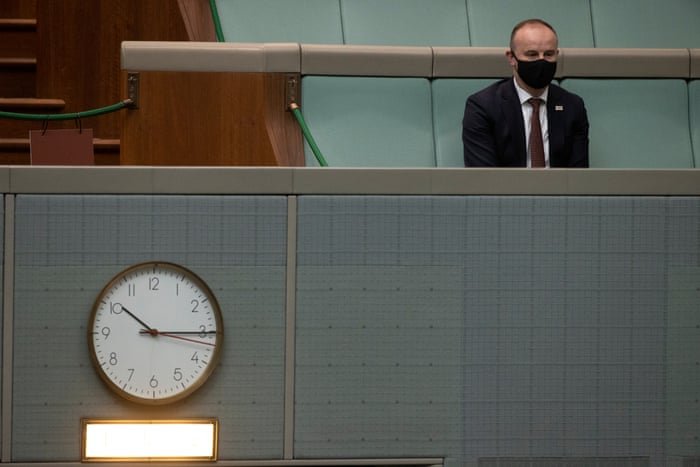

Josh Taylor
Tiktok working with the Australian Information Commissioner
Just on my last post regarding the privacy commissioner looking at TikTok’s data collections, a spokesperson for TikTok has confirmed the company is working with the Office of the Australian Information Commissioner (OAIC):
We reached out to the [OAIC] with whom we are now in correspondence. Given the many inaccuracies and mistakes in Internet 2.0’s report, we look forward to providing a clearer and more accurate picture to the commissioner.
Internet 2.0 misstates the amount of data we collect. For example, we do not collect user device IMEI, SIM serial number, active subscription information, or integrated circuit card identification number. We do not have automatic clipboard access, though it may be initiated by a user. Unlike other apps, we do not collect precise GPS location but use approximate location information like IP addresses to make broad inferences that help us comply with local laws in the markets where we operate. It also helps us support fraud prevention and detection, and prevent inauthentic spam or bot-like behaviour on our platform.
The former prime minister and deputy prime minister have been sworn into the parliament.
Mike Bowers was there, of course (I swear that man clones himself, the amount of places he gets to).
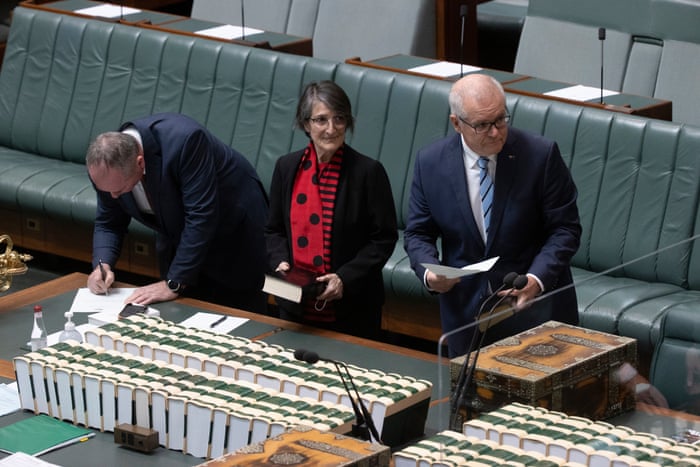
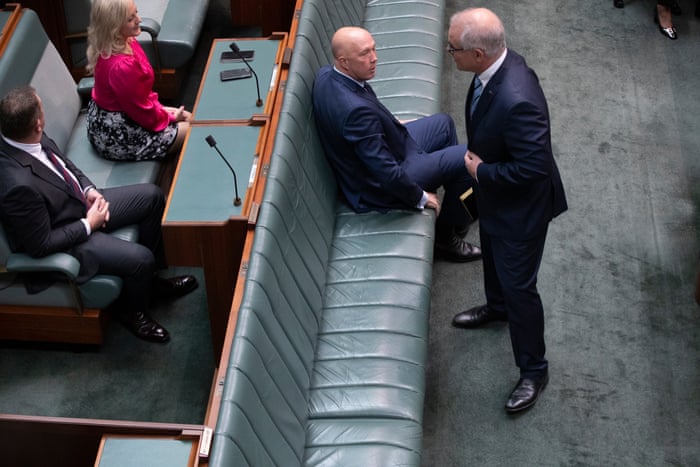

Josh Taylor
Australian privacy watchdog monitoring TikTok over user data concerns
TikTok is in the eye of the privacy commissioner, according to a report in the Australian Financial Review that the commissioner is considering the privacy concerns regarding an Internet 2.0 report on what data TikTok seeks to collect through the app.
The report looked at TikTok’s code and criticised the number of permissions that the app seeks for access to information on Android devices such as calendars, location information, phone number, SIM card number and storage.
This has sparked concern from those who were already worried about TikTok originating from China, with some calling for more scrutiny over the wildly popular social media app.
The Office of the Australian Information Commissioner provided the same statement to the AFR it has provided other outlets in the past few weeks. That is:
We are considering privacy concerns raised in the Internet 2.0 report in line with our regulatory action policy.
Platforms and apps must be transparent in how they treat their users’ data and protect their privacy, particularly for vulnerable users such as children, and should only collect information that is reasonably necessary to deliver the service. In regards to consent, individuals need to be provided with genuine choices around how their personal information will be handled, and those choices need to be inherently fair.
Members of the public should also review their privacy settings regularly.
As my colleague Alex Hern wrote last month, the problem with TikTok isn’t unique to TikTok. The kind of data the company seeks is what is called fingerprinting – which is used to track users across the internet for advertising purposes and what Apple is trying to crack down on – so the issue people have with TikTok is an issue they should also have with a lot of other non-Chinese companies.
Hern:
The problem with TikTok is no more and no less than the fact that it is a tremendously influential and important app, owned by a Chinese company. There is no technical data that will answer the question of whether that level of social and cultural power ‘should’ be in the hands of a company with roots in a geopolitical opponent.
Karen Andrews moves motion on Department of Home Affairs
Karen Andrews is moving a motion in the house on home affairs – the former minister is upset with the changes Labor has made to the portfolio. But as part of that, she seems to make a call for whistleblowers within the department to come forward to her office:
I do encourage any of the hardworking individuals within the home affairs portfolio, as it was, to contact my office if they find there are issues as a result of this government. I will respect your confidentiality.
That’s certainly a turnabout from the Coalition when it comes to whistleblowers in the home affairs department (and beyond, given prosecution decisions).
This is the motion:
Mrs Andrews, pursuant to notice, moved — That this House:
(1)recognises that since it was established by the previous Government in 2017 the Department of Home Affairs, as it was structured, has been important in keeping Australians safe and secure;
(2)acknowledges the vital work of the law enforcement and national security agencies that have worked very closely together under the Home Affairs portfolio;
(3)notes that the Department of Home Affairs was fundamentally changed by the current Government, as announced on 1 June 2022; and
(4)calls on the Government to ensure that these fundamental changes to the department will not reduce the operating budgets of our national security and law enforcement agencies.
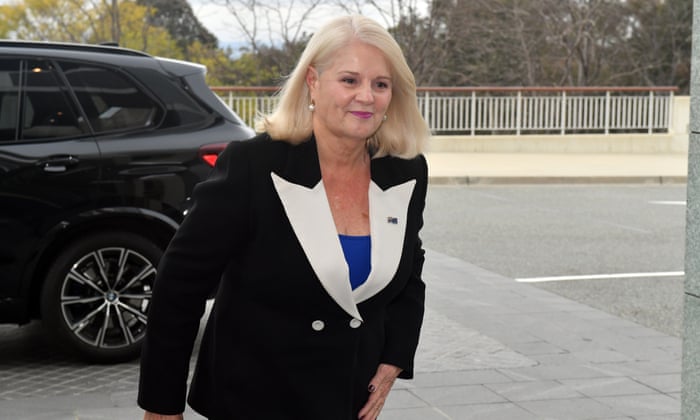
Territory rights bill introduced
Alicia Payne is seconding Luke Gosling’s bill to restore territory rights.
The bill does not make voluntary assisted dying legal in the territories – but it gives those within the ACT and the NT the right to have the debate and decide for themselves.
In 1997, Kevin Andrews successfully led a push to take away that right.
Scott Morrison and Barnaby Joyce return to parliament
Also in the House:
Scott Morrison is making his first appearance since parliament began after heading to Japan for a conference with a bunch of other former conservative leaders.
Barnaby Joyce has returned from leave following the death of his father last week.
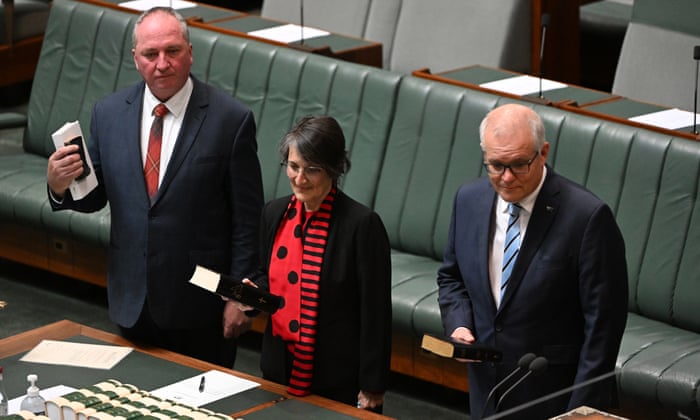
Government to publish aged care Covid vaccination rates online
In a bid to improve transparency, the government is making public the Covid vaccination rates for aged care residences:
From today, 1 August 2022, the aggregated data for each residential aged care home will be available in both a list and interactive map.
The data will be updated weekly on the Department of Health and Aged Care’s website, health.gov.au.
ACT chief minister Andrew Barr is in the gallery as Labor MP Luke Gosling introduces a private members’ bill to restore territory rights.




















Discussion about this post